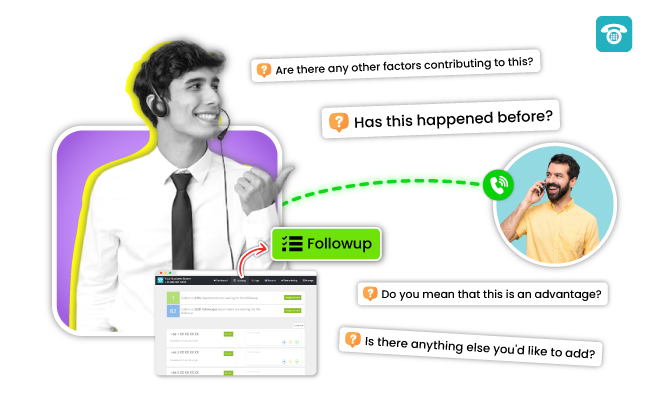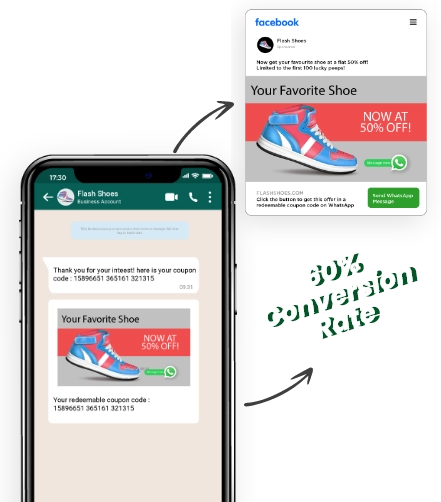Closing a deal with a prospective client is a demanding job that might take days or even weeks. You need to make the initial and follow-up calls at the right moment and allow your prospect to think and slowly form an opinion in the meantime. There are other means of communication you could be using, such as email or texting. But sales follow-up Questions can make a truly positive impact on the prospect if you know how to handle them.
And, while most sales representatives feel like it’s the script they need to follow blindly to make progress and eventually close deals, we need to differ. Your script can only take you so far, but what you need to do during a follow-up call is listen and respond to what your buyer is saying. To do that, you’ll need a set of follow-up questions and a sense of when to use them.
If you’re not sure what follow-up questions to use on a follow-up sales call, just keep reading. Here’s our list of the 7 best ones you shouldn’t skip.
7 Sales Follow-up Questions You Must Ask on a Follow-up Call:
![7 sales follow-up questions you must ask on a follow-up call. [Illustration by MyOperator.]](https://myoperator.com/blog/wp-content/uploads/2021/05/7-Sales-Follow-Up-Questions-You-Must-Ask-On-A-Follow-Up-Call.png)
Q1. What exactly do you mean? Could you clarify?
As we’ve already mentioned, listening to what your prospects have to say is important for the business you’re representing. You can have a great content marketing strategy, social media presence, branding, and website, but without proper one-on-one communication during sales calls, it all may go to waste.
Focusing too much on your script might lead you to miss out on great communication opportunities and encourage your prospects to speak up.
That is why this is a great question you should use in a sales follow-up call to show the buyer:
- You’re listening to what they’re saying;
- You’re interested in their needs/opinions/ideas/situations; and
- The call is about them, not about you.
So, whenever you have a buyer say something interesting that might be significant for your potential deal, ask them to clarify. Give them a chance to explain and feel like you truly care about what they’re saying.
Q2. Why (is that)?
If your prospect is talking about a potential problem or pain point they’re experiencing, you have to grab a chance to deepen that conversation. You need them to open up so that you’d be able to offer the right solution and show them why this deal is perfect for them.
This is why a simple question such as “Why” can pleasantly surprise the prospect and truly stir the conversation in the right direction. It’ll get your potential buyers to:
- Reveal more about a problem/pain point;
- Open up to you; and
- Share something specific about their case.
All of this allows you to build a better case and personalize the offer you’re trying to make. As a result, the buyer might feel more willing to give it a try and close the deal with you.
Q3. Do you mean [rephrase what they just said]?
Another way to show your prospect that you’re listening and understanding is to rephrase what they said to confirm you’re on the same page. This follow-up question is brilliant since it shows the buyer you know exactly what they’re thinking or how they feel.
So, look for an opportunity to use this question when:
- The buyer finds something hard to explain, so you jump in to help;
- You actually aren’t sure they’re saying what you think they are; and
- You want to emphasize something valuable they just said.
Asking your prospect if they’re saying what you think they’re saying is a strategy that’ll work out great when used at the right moment, so make sure it’s on your list of must-ask follow-up questions.
You can use this rephrasing strategy for all kinds of topics you’re covering with a prospect. In case you need help expanding your vocabulary and practicing expressing your ideas and rephrasing theirs, reading might help. To build your expertise, you can explore different topics to ensure you always have the right words to say what you want.
Q4. How does this impact you/your business?
Listening to what the buyer has to say about a problem is one thing. Truly understanding how this problem influences them or their business is a whole other thing.
This is why you should include this follow-up question to your questions list, to make sure you know exactly what they’re dealing with.
So, when a potential buyer starts talking about an issue, pain point, or problem, ask this question to be able to:
- Understand what consequences come with this problem;
- What other issues come out of this primary one; and
- How does this affect the everyday professional life of the potential buyer?
Get more details on the depth and size of this problem to be sure you’re offering the best solution.
Q5. Is it because of what you said about…?
Connecting the dots in a conversation is crucial. Both you and the potential buyer have to feel like the conversation is progressing and nobody is wasting their time. This is why you need to mark small victories and show you’ve reached a turning point together.
Therefore, you have to make a connection between different parts of the conversation and make sure you’re keeping track of all the essential information that’s being shared.
Asking a question such as this one shows the buyer the following:
- You’re actively involved in this conversation;
- The follow-up call is directed toward the buyer on a more personal level;
- You care about every word they’re saying; and
- You’re drawing conclusions based on what they say.
Drawing the right conclusions and making the conversation valuable for both parties is significant. This follow-up question can help you nail it.
Q6. Has this happened before?
When a potential buyer is describing a problem or a tricky situation, you should try and learn as much about it as possible. Asking whether it has happened before will allow you to learn more about how the client has already handled these problems.
The best thing about this customer follow-up question is that you can ask additional follow-up questions that are just as great:
- How did you deal with it before?
- What were the results?
- What were the consequences?
- Who helped you do it?
- Are you happy with that solution?
This way, you’re making sure you know how this person thinks, operates, and solves issues. This will help you create a better offer for them and increase your sales call close rate.
Q7. Is there more?
When the conversation starts approaching the end, you need to use that final opportunity to round it up and ensure it was a success. Your buyer must memorize this call as proactive, informative, and beneficial for them.
This is why you should ask them whether there’s something more they’d like to share with you. Give them a chance to speak their mind without being constrained by a script you’re trying to follow or a path that you chose for the conversation.
This might inspire them to share some final but essential details and give you additional information you otherwise wouldn’t get. Plus, it’s always a good idea to show the potential buyer you have all the time in the world to listen to what they have to say.
Final Thoughts
The importance of follow-up in sales call needs to be well-guided and professionally executed. But, you can’t allow yourself to sound like a robot reading from a script. Instead, you should keep the conversation flowing naturally by asking the right follow-up questions and responding to your prospect’s words the right way.
Hopefully, the 7 sales follow-up questions I’ve listed above will help you improve all your future follow-up calls and seal more deals than ever. Use them to guide the conversation and make the most out of every call.





